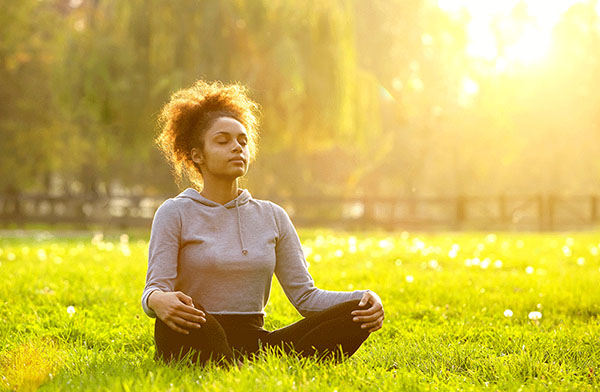As we make our way from childhood to adulthood, increasing financial responsibilities, social pressures, and health uncertainties hit us hard. Every day is an avalanche of impending deadlines and competing priorities constantly clamouring in the background to have our attention. Amidst all the chaos, we unknowingly push our mental well-being to the bottom of our priority list. As a result, it is not shocking to see every other individual struggling with poor mental health. If you, too, are on the same ship, why not do something about this? The good news is that it is not as complex as it might seem, and improving your mental health is as simple as applying some basic wellness practices. One way to bring it about is meditation. A mind-body-complementary medicine, meditation is a perfect tool to improve your mental health. Here are some effects of meditation on our mental health:

Amidst a web of chaos and confusion, our minds latch to whatever thought or emotion bubble up or whatever we see. The constant judgment, inner turmoil, and dialogue resulting from it weaken our ability to focus and make our way out. Through meditation, you can back away from all this and step into the space of self-awareness. It is more helpful in treating chronic disorders such as depression and substance abuse disorder. For instance, mindfulness meditation can increase your awareness of your cravings and help you put them down instead of getting carried away, drastically reducing the chances of a relapse. So, if you or your loved one is struggling with addiction, learn more about its treatment programs and choose the one that includes mindfulness meditation to deal with unwanted impulses. You can analyze the present moment without steering away from negative emotions and see the world and your situation in its true colors. With calmness and awareness over time, your steering thoughts cannot catch you off guard. By combating the emotions that can be self-defeating, you are taking a step toward your groomed self.
Stress and anxiety arise because of the pressure our minds can not handle. When this load exceeds our emotional strength and resources, our mental health becomes the victim.
Whenever you come across this situation, the first question to ask yourself is whether or not the response to a stressor is truly necessary. But do we have a space to figure this out in our minds? The answer is no – not until we actively seek to sort out essential things from the non-essential. It is where meditation jumps in to save the day. It gives us an opportunity and space to analyze which emotions are worth it and which are a mere waste of time and energy. Think how different your response to everyday situations would be if you distinguished the two! You will experience immense relief with the clarity to sort out your priorities. You will view stressful situations as an outsider rather than the one trapped within.
Scientifically speaking, meditation lowers the level of stress hormones and reverses the stress response by normalizing your heart rate, breathing, and blood pressure. It clears the mind and enhances your creativity. It will increase your mental resources and help you become more capable of handling problems.
Jumping under the covers with a wired and stressful mind only leaves you tossing and turning all night. If you are an insomniac, you will view bedtime as stressful rather than an opportunity to shed your exhaustion. If you are short on sleep, you might feel grumpy and foggy, leaving your mind more sensitized to daily stressors. A well-rested mind is essential to regulate behaviours and emotions. To improve your sleep and mental state, practice mindful meditation before bedtime and acclimatize your mind for a peaceful sleep. After having a good night's sleep, your cognitive skills will improve, and you will be ready to face a new day.

Do you face difficulty in maintaining your concentration? You are not the only one. Researchers suggest that the human mind is lost in its thoughts 47% of the time. Many distractions surround us in this digital age, and it is easy to lose focus while sorting out a jumble of tasks. The daily grind pushes you to multitask, and you have no option but to comply. Unfortunately, this doesn't work well every time. While jumping from task to task and with hundreds of thoughts flitting through our minds, our attention span has become shorter than ever.
You can considerably improve your attention span through focused meditation. Put all your focus on a single point and realign all your wandering thoughts to that specific item. Take note of your breaths and pay attention to the inhale and exhale sensations. Even brief meditation sessions will train your mind to be attentive and build discipline. With a heightened focus, you will be more productive and achieve bigger goals in less time.
Whatever we struggle for in life, whether for fame, relationships, or money, the motive is to avoid dissatisfaction and seek happiness. However, there is a limit to what these extrinsic factors can bring to you. Situations change, people come and go, financial conditions vary, children grow up and leave home, and health becomes more unreliable. While we cannot change this cycle of the outside world, we can certainly change what lies within us. Our mind has an intrinsic store of happiness locked away beneath the superficial layer of pain and dissatisfaction. Meditation can come in handy to unlock this internal treasure. As you practice daily meditation, you enhance self-confidence and belief in your goodness. By quieting the mental clamour, you see yourself and the world with a renewed vision that brings you everlasting satisfaction.
Mental health is as essential as physical health, yet you will see many people working for the latter, while the former remains a stigma in many parts of the world. It is a crucial part of our overall well-being, but prioritizing mental health is easier said than done. You might not know where to start or lack the motivation to step into a new journey. However, meditation has many benefits, and you will miss out on them without giving it a shot. So set aside some time for meditation to tap into your innate sense of peacefulness and everlasting gratitude.
Be the first to post comment!